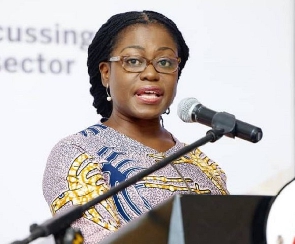Second Deputy Governor of the Bank of Ghana (BoG) Mrs. Elsie Addo-Awadzi has emphasized the importance of data if the progress of financial inclusion is to be monitored.
She said data is essential as it helps to measure the gaps in inclusion, design appropriate evidence-based interventions, and monitor their implementation and effectiveness.
Speaking at the launch of the Global Findex Database 2021 at the maiden edition of the ISSER inclusive finance development series in Accra, Mrs. Addo-Awadzi said with the existence of several data sources such as the World Bank, IMF and AfDB, it has been revealed in the 2021 Findex Report for instance, that Mobile Money has become an essential driver of financial inclusion in Ghana, with accounts surpassing traditional banking.
Also, through data, the gender gap in access to finance as of 2021 has been identified as 11 percent compared to an average of 12 percent for Sub-Saharan Africa.
Secondly, the percentage of women accessing finance had increased from 27 percent in 2011 to 63 percent in 2021.
“In monitoring progress in financial inclusion, the role of data cannot be overemphasized. Data is essential to help measure gaps in inclusion, design appropriate evidence-based interventions, and monitor their implementation and effectiveness. As it is often said about data, “what gets measured get done”. For data to help achieve these objectives, it should be comprehensive, high-quality, consistent, reliable, accessible, and connected with other related data bases. Both supply and demand-side data are key to help achieve these stated objectives,” she said.
The Bank of Ghana she stated has over the years taken a number of initiatives to get more people into the finance arena.
“On its part, the Bank of Ghana, in addition to promoting financial stability, financial integrity, and consumer protection, has always been fully committed to promoting inclusive finance. Specifically, the Bank of Ghana has over the decades, provided the enabling regulatory environment to support the provision of banking, remittance, and payments services by a diverse range of licensed institutions to meet the needs of economic actors including individuals, micro and small businesses, and informal sector players,” she said.
Adding that, “whether through the introduction of the post office bank system in the 1960s to provide banking services to the unbanked, the licensing regime for rural and community banks in the 1970s to promote financial intermediation in the remotest parts of the country, the introduction of the savings and loans sector in the 1990s and the microfinance sector in the mid-2000s, the introduction of branchless banking and mobile money, and more recently the licensing of Financial Technology firms (Fintechs) to partner with banks and other financial institutions to help launch more innovative digital financial services and payment platforms, financial services have over the years been brought closer and closer to the doorstep of every Ghanaian and every business.”
A Lead Economist at the World Bank, Dr. Leora Klapper in a presentation via zoom, said the role of financial inclusion in National Development cannot be overemphasized, hence the Bank decided over the last decade to come up with the various indicators collated from more than 100 economies to ascertain how the financial inclusion drive is faring.
“Since 2011, the collection of the first and only comprehensive source of global demand-side data on financial inclusion in 140 plus countries began. The survey sought for answers and questions about how adults worldwide manage their money, make and receive payments, save, borrow and manage financial risks,” she said.
Dr. Klapper indicated that, “In Ghana, two million unbanked adults received agriculture payments in cash only. Half of the adults who made digital merchant payment did so for the first time during COVID-19,” she added.
The Director of the Institute of Statistical Social and Economic Research, ISSER, Prof. Peter Quartey said the inclusive finance development series is an initiative which is geared towards positioning African Research Institutions at the forefront of advancing evidence for the development of an inclusive financial ecosystem.
“The platform is designed to facilitate evidence led engagement on inclusive finance between academia, policy makers, commercial providers and consumers. We at ISSER are committed to facilitate an independent African led and evidence driven platform, dedicated to generating and facilitating the use of evidence to advance and safeguard inclusive finance in developing economies especially, Africa,” he said.
For his part, the Chief Executive Officer of the Ghana Chamber of Telecommunications, Dr. Ken Ashigbey called for intentional efforts by all key stakeholders to rake in more people onto the financial space through the reduction in prices of mobile devices in Africa.
The Global Findex Database which provides almost 300 indicators on topics such as Account ownership, Payments, Savings, Credit, and financial resilience, disaggregated on the basis of gender, age, and other demographics, was put together by ISSER and the World Bank.
Business News of Sunday, 14 May 2023
Source: gbcghanaonline.com



![New IGP, COP Christian Tetteh Yohonu [L] and immediate-past IGP, Dr. Akuffo Dampare New IGP, COP Christian Tetteh Yohonu [L] and immediate-past IGP, Dr. Akuffo Dampare](https://cdn.ghanaweb.com/imagelib/pics/140/14041582.295.jpg)









